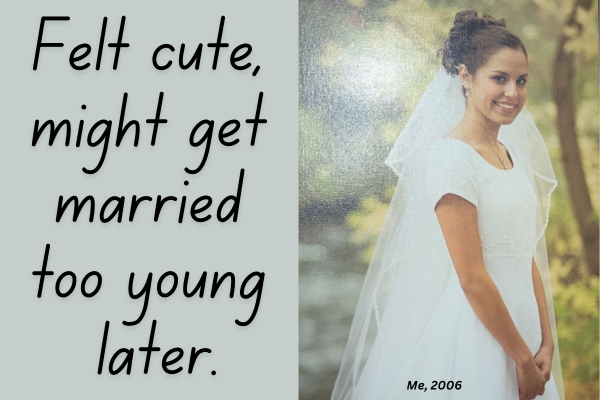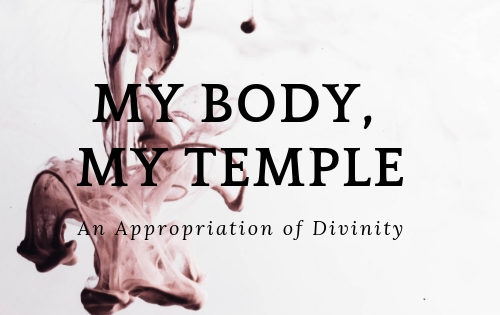
“You’d Make a Good Bishop’s Wife”: When a Compliment Starts Sounding Like an Insult in Hindsight
The CEO of a company I worked for many years ago, a man in his late 40s or early 50s, told me I would make a good bishop’s wife. I was in my early 20s, still Mormon,1 and still the wife of the man I’d married in a Mormon temple2 at 19 years old.
At the time I took it as a compliment. Now I find it problematic for many reasons, the least of them being the total lack of boundaries almost everyone had at that workplace, including my young, painfully naive self.3
A little context:
- In Mormonism (the specific branch I grew up in is called The Church of Jesus Christ of Latter-Day Saints), a bishop is an unpaid lay clergyman—he’s always a man—who leads his local congregation (AKA “ward”) of fellow Mormons. People call him “Bishop” deferentially and ascribe to him certain authority over (and access into) their lives.
- A bishop’s wife (a bishop is always married, and to a woman) is held to a certain standard by association. Her role is to support her husband not just with her willingness to come second after the congregation, but by demonstrating to the other women in their ward what it means to be an exemplary “helpmeet.”4
After the CEO told me I would make a good bishop’s wife, I remembered my Patriarchal Blessing,5 which I’d received just a few years before becoming a teenage bride.
The church is part of my history now, and my history—my story—is mine to tell.
Visiting the Patriarch to get a blessing is treated as a rite of passage in Mormonism, and mine (the blessing and the Patriarch) leaned heavily into the ways I would use my talents to lead others and be looked to as an example of faith. (My mom took this to mean I’d be the next Sheri Dew).6 He also blessed my future husband, through me, that he’d come to understand the beauty of womanhood because of me.7
See that? I was being a helpmeet already, not even batting an eye that my future husband was already edging in on a moment that was supposed to be about me.

Preordination and the illusion of choice
I used to think I didn’t have a choice in the matter of marriage and childbearing. As a teen, this was in line with a mounting and highly specific anxiety that my life would never really be mine.
There is so much emphasis on obedience in the LDS church. The only acceptable choice is the choice to obey.
I would marry and have children (if I was lucky), and it was also entirely possible that the man I’d marry could have it revealed to him Holy-Spirit-style that I was supposed to marry him.8 And I’d have to do it, whether I really wanted to or not. My future husband’s ability to divine God’s will could very well supersede mine, and that would be that. Commence trusting in God and enduring to the end.9
This is what the anxiety told me, but the doctrine didn’t effectively refute it either. In fact, my Patriarchal Blessing fed this anxiety like an espresso shot. It started to be clear I didn’t have a choice about the things I would be and do. It was all preordained. Moreover, I was supposed to want all those things more than anything—motherhood, wifehood, leadership roles within the church, glory in the afterlife. But I was ambivalent at best about all of it. And to stay worthy to receive what I was supposed to want, I’d have to obey.
So much emphasis on obedience. The only acceptable choice is the choice to obey.
Self-deny, comply, and obey. Be grateful for what you’re given. Get those things down and you’re on your way to becoming a proper gust of wind beneath your husband’s wings, a good wife, the better half that was never meant to be whole.
The expectation to self-deny and comply
As a teen, if a guy ever liked me, I would immediately assume an obligation to like him back, and it would often make me nauseous—what if he or I received a sign I was supposed to marry him? The anxiety that God could make a decision for me, through someone else, in spite of my own instincts, was increasingly preoccupying. To avoid divine punishment or a withdrawal of eternal blessings, would I always be expected to self-deny and comply?
Choice, agency, consent, I learned again and again, were illusory in the grand scheme of things. And they were necessarily null next to the edict to obey.
At church dances, the girls were told never to turn down a boy who asked them to dance, because it took them a lot of courage to ask and it would hurt their feelings to be told no. Helpmeets in training, we learned early the importance of prioritizing male emotion and need over our own.
After expressing my discomfort about a guy trying to pay for my food on an outing I hadn’t wanted to be a date, a friend told me I was rude. If a guy wanted to take me on a date and treat me, I was supposed to accept and be grateful for the attention.
Self-deny, comply, and obey. Be grateful for what you’re given. Get those things down and you’re on your way to becoming a proper gust of wind beneath your husband’s wings, a good wife, the better half that was never meant to be whole.
“You don’t have to do anything you don’t want to do.”
I complained to my grandma once that a cousin was trying to boss me into social plans I wasn’t interested in. She said, “Well, Bekah, you don’t have to do anything you don’t want to do.”
Later, I told my mom what Grandma had said, not necessarily in response to a request Mom was making of me, but in appreciation of the information I’d just been given, and my mom said, “Well, some things you do have to do whether you want to or not.”
I wonder now what things my mom had specifically been thinking of. Going to work? Going to church? Paying bills? Paying tithing? Swallowing pride? Obeying?
I took my grandma’s message to mean simply that I was allowed to say no to things sometimes, and to people, but saying and asserting “no” still feels uncomfortable to me, even though I’ve gotten better at it in recent years. In fact, my early obedience training—those lessons in self-denial, even self-betrayal—sometimes made it feel impossible to say no.
And that’s a horrible feeling.
I refuse to be a “wife,” much less a bishop’s wife
I recently had the opportunity to sit on a panel with coworkers to discuss James Clear’s book Atomic Habits. On the subject of accountability partnering, a coworker named his wife as his biggest support system.
“Wives are great,” he said. “If you have a great wife, she’ll correct you and help you be better.”
We were being filmed, and watching the video back, I’m profoundly grateful I didn’t make a face. The comment simply hit too close to home, a reminder of all the expectations I’d been raised to believe it was my duty to meet, even exceed.
I want someone to grow better together with, both of us responsible for ourselves, and both of us free to leave for better partners if either one of us starts taking more than they give.
I think again about my early training. About everything I was supposed to have been for my ex-husband. And I’m glad I failed. I’m also glad I never became a bishop’s wife (or a version of Sheri Dew for that matter). Committing myself eternally to supporting and improving another person, another adult no less, is not a responsibility I’m interested in signing up for. I’m not a life coach, therapist, or project manager. I’m not a consummate cook or a maid. I’m not a lot of things wives are expected to be as a matter of course and without compensation.
I think about Judy (Syfers) Brady’s infamous essay “I Want a Wife,” and about one of my favorite movies and stories of all time, Jane Eyre.
“Jane, I want a wife,” says Mr. Rochester in the denouement of the Ruth Wilson and Toby Stephens adaptation. “I want a wife, not a nursemaid to look after me. I want a wife to share my bed every night. All day if we wish. If I can’t have that, I’d rather die.”
In both explorations of “wife,” I hear my own feminist rage and my own longing for an equal partner in passion and purpose, someone to romp and achieve with. I don’t want a dutiful relationship. I want someone to grow better together with, both of us responsible for ourselves, and both of us free to leave for better partners if either one of us starts taking more than they give.
Self-reclamation feels so good
I got married again recently, to a man, but I don’t call him my husband. Because husbands have wives and I already did marriage that way once. The first time around, I changed my last name and believed it was borderline infidelity not to wear my wedding ring. I did all the wife things—not well, but I did them, or felt deficient or rebellious for not doing them, until “husband and wife,” and the ring, and the new, ill-fitting last name, all began to feel like the bars of a cage.
I love the power of words, and every time I refer to my partner as my “partner” or my “spouse,” it feels like reclamation. I was also the one to propose to him. That felt like reclamation too. And we were engaged for a few years before saying self-written vows to each other outdoors and near a lake in our mid-30s.
I’ve done everything differently the second time around. And god, it feels good—the choice of it all.

I opened Pandora’s box, and to my ever increasing joy and relief, I found the courage to look inside.
Spicy Epilogue: Is it wrong to criticize leaders of the LDS church even if the criticism is true?
Dallin Oaks, a member of the leadership of the Church of Jesus Christ of Latter-Day Saints (popularly called the Mormon church), has said, “It’s wrong to criticize leaders of the church even if the criticism is true.”10
When I was a teen, my dad remarked after General Conference11 one year that one of the speakers had come off as arrogant to him. His brother-in-law, one of my uncles, was quick to rebuke him: “Watch it. That’s a man of the lord right there.”
One of my grandmas, a lifelong tithe-paying member of the LDS church, once interjected during a conversation about Joseph Smith, “Now why’d he have to go and get all those wives?”
I don’t recall anyone responding, but I recall her disgust and the alarm and awkward silence that ensued. What was this? Criticism of the very founder of the church we were all destined to serve and give money to for the rest of our lives? Grandma?!
Also, Joseph Smith was a polygamist, too?! I’d known about Brigham Young and a bunch of other historical Mormons, but Joseph’s romance with Emma was pedestaled as the ultimate love story. She was his one and only and he would delve into hell itself to redeem her if necessary,12 a true Orpheus to her Eurydice.
A Joseph Smith with multiple wives didn’t compute and I didn’t pry further until much later.13
There were the stories I was told and the stories I heard whispers about, which were unequivocally unsanctioned. I was cautioned never to seek them out. But we each have a right to informed consent, so I disobeyed. I opened Pandora’s box, and to my ever increasing joy and relief, I found the courage to look inside.
Mormonism is a part of my story and history now, whether I like it or not
In this essay, I’ve written about some of my experiences as a once-member of The Church of Jesus Christ of Latter-Day Saints in a way that isn’t legitimizing, servile, or reaffirming. In the footnotes, I mention aspects of church history that aren’t widely circulated or discussed outside the boundaries of abject apologism. In short, I write about the church in a way that is likely to upset believers.
Many of the people I love, love the church. It is physically and emotionally painful for them to hear it criticized. It angers and saddens them, or simply makes them anxious. And how could it not upset them? Their own leaders are telling them it’s wrong to speak such criticism aloud or even think it, even if it’s true.
Why is it wrong? Because their eternal salvation and the salvation of all they hold dear is on the line, and the church has positioned itself as the gatekeeper.
When they hear the church criticized, they remember the people they love so desperately they refuse to imagine an afterlife without them. They remember their fear of death.
When they hear the church criticized, they imagine a reality in which they’ve been defrauded of hundreds of thousands of dollars, even millions when you consider the collective generational wealth some families have poured into the church14—the sunk costs are astronomical.15
When they hear the church criticized, they think, “But I know it’s true. Evidence to the contrary be damned.16 I’ve had this and this experience that prove to me it’s true and that’s enough for me. Other explanations aren’t worth investigating.”
When they hear the church criticized, they think, “But it makes me happy. Those it makes unhappy are doing it wrong.”
Don’t let my occasional snark mislead you—I don’t take the things I’m saying here lightly. I was once a member too, and I remember the pit of confusion and anxiety I’d feel in my gut when “anti-mormon” anything crossed my path.
My intention with this essay isn’t to upset my loved ones or other believers. It’s not to debate the veracity of the church, the integrity of its leaders, or the legitimacy of believers’ faith. Believe what you believe. Share your story and your conviction far and wide. I will do the same. That is my intention.
“People leave the church, but they can’t leave it alone” is a criticism I’ve heard in the past when I’ve shared my perspective about the organization I was raised in and paid tithes to for 26 years. To that I say, if it takes me 26 years to process the experience, so be it. The church is part of my history now, and my history—my story—is mine to tell.
Footnotes
- Despite the I’m a Mormon marketing campaign of 2014, which included a Meet the Mormons documentary that was released in theaters and produced by the church, today’s church president/prophet has called the use of the term “Mormon” to describe members of the faith as “a victory for Satan,” and some members have taken to treating it as a slur. You read that right: today’s “conduit of God’s voice on Earth” called the pet marketing campaign of yesterday’s “conduit of God’s voice on Earth” a victory for Satan. ↩︎
- One of the first stories in the Book of Mormon is the one about the tree of life, a straight and narrow path, an iron rod, and a great and spacious building in which the most sinful (i.e., funnest) party imaginable is taking place. Partygoers peer and lean out of the windows to point at and mock the people on the path for missing out on all the fun. “Fear the great and spacious building” and “hold to the rod” are the intended takeaways, but since leaving that path, it’s clear to me which great and spacious building deserves my distrust when I look at a Mormon temple. There are about 190 of them around the world today, each costing between $7 and $70 million to build. Only the worthy (those who pay their tithes, etc.) are allowed inside to perform rituals for themselves and for the dead, and they stand empty most of the time. They’re also covered in masonic symbolism and outfitted with the most ornate, audacious, and expensive of furnishings, but in stark contrast with the great and spacious building described in Mormon scripture, they’re boring as hell inside. ↩︎
- This same CEO scoffed at the idea of sensitivity training after a male coworker said something more overtly sexist to me later on. ↩︎
- The interpretation of “helpmeet” as a woman who dutifully exists within the context of her husband’s need has long reigned as the norm in the church and Christianity at large. I regularly observe the effects in most of the “traditional” relationships around me, but a more progressive definition of this term has “meet” meaning “equal” and seeks to negate the subservient connotations of the word. But Mormon women were covenanting to obey their husbands as part of ritualistic temple ordinances until 1990, when collective blood oaths were also removed. And when I participated in these rituals in 2006, the language that said I must “hearken” to my husband while he hearkened to God was still a part of my experience. This language was removed as recently as 2019. ↩︎
- A prayer said over me—hands upon my head—in my teens by the local Patriarch (think Mormon fortune teller), whose special calling it was to give prophetic blessings to the local youth members. ↩︎
- I don’t actually know much about Sheri Dew except that she’s a writer for the church focused primarily on building up the faith of the youth. I’ve never read anything she’s written, but as a kid I quickly grew to resent being compared to her, the implication being that even my writing voice would one day be “owned” by the church, along with everything else about my life. ↩︎
- This is a particularly delicious irony considering the way our marriage ended. (To our eventually mutual relief, I blew it up.) But one of the first things he told me when we started dating was that he didn’t trust women. I thought of my Patriarchal Blessing again and took it as a sign I was supposed to be the one who’d restore his faith in womankind. Ha! ↩︎
- I worked with a man who’d said as much to his wife after days of knowing her. They married within months and his marriage sounded like a nightmare. ↩︎
- I didn’t know it yet, but the precedent for this very scenario had been set by the founder of Mormonism himself, Joseph Smith, and his treatment—pursuant of revelation of course—of all the women and young girls he propositioned and married regardless of the fact many of them already had husbands, and regardless of their own wishes. (The anguish expressed in the journals of some of these women and girls… One was as young as 14 when she married Joseph, who was 37—Helen Mar Kimball. See Nancy Rigdon’s story to learn what it had been like to be propositioned by Joseph Smith and refuse him). ↩︎
- Oaks said this during a PBS interview titled “The Mormons” in 2007, in which he was asked about another statement he’d made in regards to investigating the true history of the church: “Not everything that’s true is useful.” A Fair Mormon article that seeks to clear up any alarm about these comments asserts this: “This quote is taken out of context by critics of the Church to imply that one should accept anything a Church leader says as true, even if it is not.” Weird. I didn’t take it to mean that at all, and that’s not what I’m implying here. I’m explicitly stating that this comment accurately describes my experience bringing up criticisms about the church before and after I left, and my observations of how others are treated if they bring up criticisms. They’re rebuked, silenced, gaslit, or ignored. Oaks says criticism is wrong even if it’s true “because it diminishes [the leader’s] effectiveness as a servant of the Lord.” And to that I say, that’s spiritual manipulation and poor justification for sidelining truth and accountability, which are pesky concepts to people and organizations that are better served by followers who shut up and pay up on demand. Oaks meant exactly what he said and it makes perfect sense to me why he said it, along with “Not everything that is true is useful.” See the BITE model for identifying authoritarian control to understand why these statements are or should be troubling to everyone. (Pop quiz: What do you call an organization that condemns criticism of its leaders?) ↩︎
- A biyearly conference worldwide members are encouraged to attend at church headquarters in Salt Lake City or online (or through broadcast television or the radio). During Conference, the prophet and other church leaders dispense social media content for Mormon and ex-Mormon influencers from the pulpit—I mean, “revelation.” ↩︎
- The quote I’m referring to is from Brigham Young: “Emma (Smith) took the revelation, (on polygamy) supposed she had all there was; but Joseph had wisdom enough to take care of it, and he had handed the revelation to Bishop Whitney, and he wrote it all off…. She went to the fireplace and put it in, and put a candle under it and burnt it, and she thought that was the end of it, and she will be damned as sure as she is a living woman. Joseph used to say that he would have her hereafter, if he had to go to hell for her, and he will have to go to hell for her as sure as he ever gets her.” Brigham Young, Journal of Discourses 17:159 ↩︎
- Brigham Young seemed to think it would be necessary for Joseph to go to hell for Emma because Emma had burned some of Joseph’s written revelation in a rage. And what was the revelation that had upset her so much? Oh, just the one where God told her husband it was okay for him to betray her with as many women as he wanted to. In fact, he was commanded to do so, and would go on to tell the women and young girls he chose for his wife collection that if they didn’t marry him, he would be slayed by an angel with a flaming sword, their families would be damned, and it would be all their fault. See the links from footnote 9. ↩︎
- The Church of Jesus Christ of Latter-Day Saints sits on a $236 billion dragon’s hoard while telling its poorest members to pay tithing even before they purchase food. The church was also fined last year by the SEC for hiding $32 billion in shell companies. ↩︎
- “If paying tithing means that you can’t pay for water or electricity, pay tithing. If paying tithing means that you can’t pay your rent, pay tithing. Even if paying tithing means that you don’t have enough money to feed your family, pay tithing. The Lord will not abandon you.” December 2012 Ensign, one of the church’s publications. ↩︎
- Except they’d probably say “evidence be danged.” ↩︎




